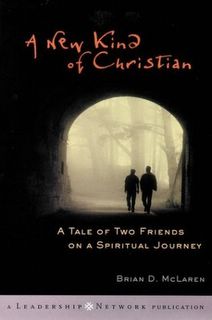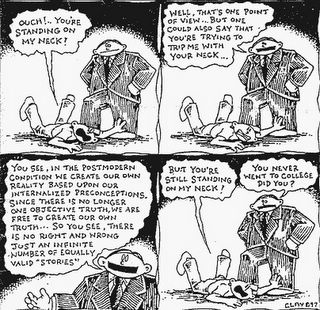McLaren Pt. 1: A Series of Unfortunate Literary Events

If you're the sort of person who hates criticism and wishes we could just forget about all this debating and arguing and just hold hands and sing campy, quasi-spiritual ditties, then you should stop reading this blog immediately. If you'd much rather read about inter-faith prayer services, cathartic support groups with lots of crying, and people who realize how petty their ideological differences really are, then you will not like this blog. But if you like a good sword fight or tales of knights vanquishing evil sorceresses, or stories of people who stand up for the right and the true even if it means the guillotine, then press on, gentle reader.
Firstly, I'm genuinely torn. I really enjoyed McLaren's book. As someone in vocational ministry who is at a point in his career similar to that of the fictional protagonist, many of the pages of McLaren's book were deeply affirming and therapeutic. As a work of fiction, it seemed like a well-crafted and creative narrative, but I'm no writer.
On the other proverbial hand, there were problems that no amount of existential empathy could overcome. From McLaren's gross over-generalizations about history, to his naive endorsement of so-called "post-modern" philosophers, to his inability to distinguish between serious historical movements and cultural fads, I was troubled by his message. Even more troubling was the wonderful, whimsical packaging in which this philosophical miscarriage was packaged.
I've decided to begin with comments concerning McLaren's hermeneutics, or Bible interpretation.
Problem #1 -- The "Grid of Decency"
Neo, the post-modern progressive in A New Kind of Christian, is addressing the debate over "literalism" in biblical interpretation. He wants to argue that evangelicals don't take the Bible quite so literally as we claim. After all, he says, "evangelicals don't say that that people who disobey their parents should be stoned . . . they don't practice polygamy, even though David and Solomon did. They don't recommend dashing the infants of their enemies against the stones, as one of the Psalms celebrated. No, they have a grid of decency that keeps them from applying the Bible literally in these situations." (Emphasis mine)
This is so misguided and preposterous that I am honestly surprised to see it issuing from McLaren's pen. Is he serious? This is not nit-picking either, because this idea is indicative of his entire approach to theological thought, and foundational to justifying certain modifications in church practice and belief.
To put it simply, the reason we don't stone disobedient children has nothing to do with "decency." It's not as if we are more decent that Moses or Joshua. There are hermeneutical principles that guide our interpretation and applicaiton of this passage. For instance, we no longer practice a majority of the Old Covenant rituals and laws because we are no longer under the Old Covenant. It would be like an American citizen paying taxes to the King of England. We didn't stop these practices because we developed a dislike for them. How we feel about God's commands is completely irrelevant to their moral authority and binding nature.
Secondly, failing to apply certain Old Testament laws has absolutely nothing to do with reading them literally. This is such a crazy assertion as to hardly be worth addressing. I can read those laws literally (how else could they be taken?) and still understand that they are not legally binding on a child of the New Covenant. I don't have to allegorize the laws or turn them into metaphors or poetry to escape from their obligation.
So, McLaren has revealed either a deep ignorance of or a rather arrogant, unjustified dismissal of hermeneutical wisdom. Our application of the Scriptures is not arbitrary. There are good reasons, other than culturally-relative tastes and mores, for our interpretations.
Part 2 to follow soon.




